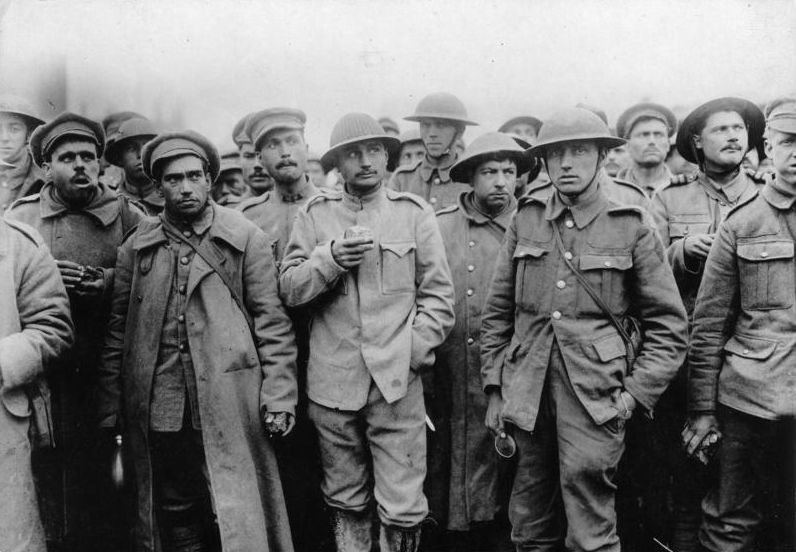 This picture of captured troops is probably from April 1918 after the Battle of the Lys, of which the Battle of Armentieres was a part.
This picture of captured troops is probably from April 1918 after the Battle of the Lys, of which the Battle of Armentieres was a part.
Prisoners in Germany
Ample provisions in the camps
The following statement, dated yesterday, is issued by the Interdepartmental Committee on Prisoners of War:-
From information received from various sources the present position regarding the evacuation of internment camps in Germany as far as British prisoners of war are concerned appears to be as follows:-
Camps totally evacuated:- Beeskow, Blankeburg, Chernitz, Clausthal, Cologne, Czersk, Darmstadt, Duulmen, Eutin, Freiburg, Furstenerg, Graudenz, Hammerstein, Heidelberg, Heilsberg, Heuberg Lazaret, Holzminden, Ingolstadt, Kamstigall, Karlsruhe, Kustrin, Lahr, Landshut, Limburg, Minden, Munster, Pforsheim, Schneidemuhle, Sennelager, Skalmiershutz, Stargard,Stralkowo, Stralsund, Stuttgart, Tauberbischofsheim, Tuchel, Wahmbeck, Zossen. A few sick men still remain at some of the above camps.
Camps partially evacuated:- Altdamm, Bayreuth, Brandenburg, Danzig (Troyl), Doeberitz, Dyrotz, Friedrichsfeld, Gissen, Gustrow, Heuberg, Mannheim, Nuremberg, Parchim, Rastatt, Sagan, Sprottau.
British prisoners of war recently repatriated state that there were ample provisions at the camps in Germany from which they were released, and that responsible non-commissioned offices had been left in charge of camps which had not been completely evacuated.
The representative of the British Red Cross Society at Berlin has also recently reported that representatives of the society are in touch with the internment camps and that there is no cause for anxiety, although there may be a relatively minor shortage occasionally at some camps owing to railway disorganisation.
Information has been received that the Netherlands Minister at Berlin arranged for a special train to remove the fit prisoners at Langensalza, via Osnabruck, on December 18 or 19. The hospital patients were to be evacuated via Baltic ports.
British medical officers have been sent into Germany with instructions to visit camps. As has already been announced, Danish Red Cross doctors are visiting the camps in the north-east part of Germany.
Since the date of the armistice, 5,288 officers, 99,247 other ranks, and 4,201 civilians have been repartiated. These figures include about 500 Allied prisoners of war.
A special commitee, representing the War Office, the Red Cross and the Government Committee on the Treatment by the Enemy of British Prisoners of War has been appointed to advise what further steps should be taken to trace missing men.
The Times, Christmas Eve, 1918
Christmas at war: An OpenLearn Live special
In the run-up to Christmas, each day this week OpenLearn is republishing a short article from contemporary newspapers capturing an officially-approved view of life in wartime during the First World War




Rate and Review
Rate this article
Review this article
Log into OpenLearn to leave reviews and join in the conversation.
Article reviews